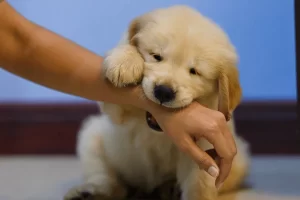
Puppy biting - how much is too much?
Puppy biting
We all know that puppy biting is an integral part of dog ownership, but how much is too much? At what point is it important to consult someone like me?
What causes puppy biting?
Puppy biting is a natural part of their development. It's how they explore the world, learn boundaries and interact with their litter mates. During play, biting helps them practice important social skills, but it also teaches them what's acceptable through feedback from their siblings and mother. When they're teething, biting may also occur to help relieve discomfort in their gums. Puppies don't bite out of aggression - they're simply learning. As they grow, it's our role to gently guide them with consistent training so they understand what's appropriate.
So how much is too much?
Let's face it, this is very subjective. Although, I think we'd all agree that if puppy is hanging from your face by their teeth it's probably gone a step too far. Most owners will tolerate some of the more gentle mouthing associated with puppy biting as they understand the reasons behind it. However, that doesn't mean it's okay to raise a little land shark. You may find that your puppy bites more depending on their breed and its characteristics; but there are still things which we can put in place to minimise it.
How do we reduce biting?
One key thing to note is a tired puppy is a bitey puppy. So ensuring they're consistently getting enough sleep will be a good foundation in reducing that biting. It's important to teach them gently and consistently what's acceptable in their new home. Redirecting their mouth onto an appropriate toy every time they bite helps them learn where to focus their chewing. Avoiding using your hands as toys is critical as this can encourage rough play. If they bite too hard during interaction, calmly stop the game and give them time to settle down again - this helps them understand that biting ends the play. You can Contact Us here to get some personalised advice.
